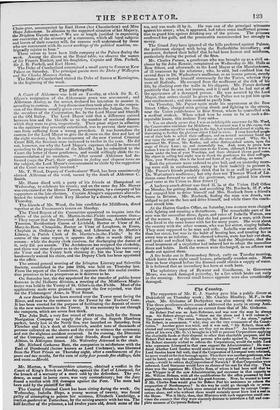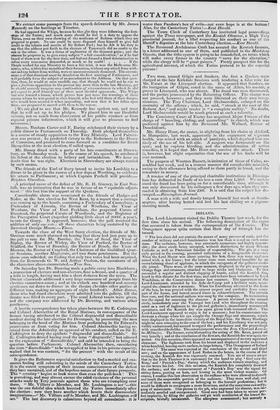Int Countrp.
The supporters of Mr. E. J. Stanley gave him a public dinner at Dukinfield on Thursday week ; Mr. Charles Hindley, M. P., in the chair. Mr. Gisborne of Derbyshire was also among the company. The three gentlemen above-named addressed the party in strong Anti- Tory;speeches. We subjoin an extract from that of .Mr. Gisborne.
Sir Robert Peel was an Anti-Reformer, and was now the man be always wars. Sir Robert always said, " Show me the abuse and I will redress it."
The answer was, " The rotten boroughs, Sir Robert." " An abuse," replied
Sir Robert, in amazement, " why, they are the very ornaments of the Consti- tution." Another point was tried, and it was said, " Sir Robert, these self-
elected and corrupt Corporations, are they not an abuse?" An honourable re- lative of his own (Mr. G.'s) brought iu a bill to prevent Corporations applying the charitable funds at their disposal to other than charitable purposes, and Sir
Robert Peel was one of the three persons who spoke against it. But suppose
Sir Robert sincerely wished to reform the Corporations, would the noble Lord who represents Liverpool in that case support the Administration ? He won- dered whether Lord Sandon would assist in turning himself out of Liverpool?
Lord Sandon knew full well, that if the Corporation of Liverpool were reformed, he never would sit for that borough again. Then there was anothergentleman, who
said he hated, not only the substance, but the very name of reform—Lord Stor- mont,—would he reform the;Corporation of Norwich? If that Corporation were reformed, Lord Stormont would have no chance of his seat for that city. Thew
there was the ingenious Mr. Charles Ross, of whom it had been said that he was Whipper. in of the new Administration, and successor in that capacity ts Mr. William Holmes, with all the qualifications for the office possessed by that gentleman, except his talents and his good-humour. Now, he wanted to know if Mr. Charles Ross would give Sir Robert Peel his assistance to reform the corporation of Northampton? In this way he could go through six or sevea towns, the Members for which were returned to Parliament by corrupt Corpo- rations aloney and who without them would certainly never have had a seat in the House. Was it likely, then, that Ministers with such supporters could con- vince the country that they were sincerely desirous to introduce a full and com- plete measure of Corporate Reform ?
We extract some passages from the speech delivered by Mr. James Keneedy on the hustings at Tiverton.
Ik had opposed the Whigs, because he thorght they were following the foot- step.% of the Tories ; and much more should he feel it a duty to oppose the 'ratio, even on their own showing of the modicum of Reform which they are prepared to grant. No one could be more disposed than himself to give full ereuit to the talents and merits of Sir Robert I'eel; but he felt it his duty to
lay that the address put forth to the electors of Tarnworth did no credit to the
ant or the other. It WAS a tissue of sophistries of the thinnest guise; and the sitroost he proposes is, to give every subject " a full consideration,"_as if he had
leard of them now for the first time, and had not formed a fixed determination to refuse every concession demanded, as much as he could ! If the l'evle wished for any Ministry to have a fair trial, it was the Melbourne Mi- mistry, who, within four months of their formation, without any attack from with-
3TA t and any failure from within, were so unceremoniously dismissed. The circum- stanc.s of that dismissal most be detailed on the first meeting of Parliament, and
will probably form the subject of an amendment to the Address. On that goes-
ties, then, he would at once candidly say, that though he could not be one to give a factious opposition to the present any room than to the late Ministry, yet Ile should scarcely imagine any combination of circumstances in which he did sot expect to find himself one of their most decided opponents. The Whigs bad now learned a lesson, which proves how just were the warnings of those among whom be was proud to class himself, who had told them of their danger, who would have averted it when impending, and now that it has fallen upon them, are prepared to march with them to the rescue.
[We are glad to see that Mr. Kennedy has spoken out, and trust that he will act up to his pledges. We placed him in our Doubtful solemn, not so much from observation of his public conduct as from especial private information, which it will give us pleasure to find erroneous.1 Messrs. Bonham Carter and F. Baring celebrated their victory by a nubile dinner in Portsmouth on Thursday. Both pledged themselves
to a course of steady opposition to the Tory Ministry. Lord Palmer- ston was present : he predicted victory to the Reformers in the flouse of Commons, and promised to come forward as a candidate for South Hampshire at the next election, if called upon.
Mr. Slancy dined with a party of his late constituents at Shrews. bury, on Wednesday week. In the course of his speech, he attributed his defeat at the election to bribery and intimidation. We have no doubt that be was right. Elections in Shrewsbury are always carried by such means.
The friends of the Earl of Surry intend to invite his Lordship to a dinner to be given in the course of a few days at Worthing, to celebrate " his return to Parliament ; at which Captain Pechell will preside._ Brighton Guardian.
A principal cause of the defeat of Mr. R. H. Gurney, in East Nor- folk, was an intimation that he was in favour of an " equitable adjust- ment :" this lost him the support of the Quakers.
Considerable alarm was occasioned to the friends of Hodges and Rider, at the late election for West Kent, by a report that a carriage was coming up to the booth, containing a Prebendary of Canterbury, a Prebendary of Lincoln, the Rector of Wrotham, the Vicar of Wrotham, the Vicar of East Peckham, the perpetual Curate of
Staiistead, the perpetual Curate of Woodlands, and the Registrar of the Prerogative Court (together yielding little short of 8000/. a. year), to vote for Geary. It appeared, however, that the poll received the addition of only one vote ; all these characters being sustained by the Reverend George Moores—Times.
Towards the close of the West Surry election, the friends of Mr. Denison were much alarmed on hearing that there had just gone up to the poll to vote for Mr. Barclay, the Vicar of Send, the Vicar of Ripley, the Rector of 1Visley, the Vicar of Purford, the Rector of Shalford, the Vicar of Bramley, the Rector of Brook, the Vicar of
Alerrow, the Rector of Crayford, the Chairman of the Guildford Quar- ter Sessions, another Magistrate, awl two State pensioners. But the alarm soon subsided, on finding that only two votes had been acquired, from the Reverends G. W. and Arthur Onslow, the sustainers of all the characters above-enumerated.— True San,
On Saturday last Dr. Bowring made a public entry into Blackburn ; 3 procession of electors and non-electors, four a-breast, and a quarter of a mile in length, having met him a short distance from the town. The Doctor afterwards addressed a very large concourse of people from his election committee-room ; and at six o'clock one hundred and seventy gentlemen sat down to dinner in the theatre (besides other parties at different inns, making an aggregate of eight hundred). After dinner, those who had dined elsewhere were admitted into the gallery, till the theatre was filled in every part. The usual Liberal toasts were given, and the company was addressed by Dr. Bowring, and various other gentlemen.
A hostile correspondence has taken place between Sir E. Codrington and Colonel Abernethie of the Royal Marines, in consequence of the former having attributed to the Colonel disgraceful and discreditable conduct during the late election for Devonport, by preventing the men belonging to the band of the Marines from performing in Sir Edward's processions or from voting for him. Colonel Abernethie having re-
ceived from the Admiralty an approval of his conduct, called on Sir E. Codrington to deny the epithets "disgraceful and discreditable." Sir E. Codrington denied having used the term "disgraceful," but adhered to the expression of "discreditable," and said he intended to bring the question before Parliament. Colonel Abernethie then, considering the term " discreditable " to be not applied to him in his private capacity, replied that he was content, "for the present" with the result of the correspondence.
It gives the Reformers especial satisfaction to find a morbid and ran- corous feeling still subsisting in the minds of the Canterbury Tories. It is the surest symptom of their intense consciousness of the defeat they have sustained, and of the hopeless nature of their future prospects. The " scrutiny" begins to look worse than even the poll-book ! This is provoking, and may almost excuse the rabid virulence of the personal attacks made by Tory journals against those who are triumphing over
them. "Mr. by is Member, and Mr. Lushington is not "—this was the one doleful idea which haunted the Tories immediately after the election : now they have another which besets their disconsolate imaginations—" Mr. Villiers will be Member, and Mr. Lusbington will ing." The last discovery is calamitous beyond all consolation : it is worse than Pandora's box of evils—not even hope is at the bottom ! Alas, for the Canterbury Tories !—Kent Herald.
The Town Clerk of Canterbury has instituted legal proceedings against the Times newspaper, and the Kentish Observer, a High Toty provincial journal, for a libel respecting his conduct as one of tile Sheriff's deputies at the late Canterbury election. —Kent Herald.
The Reverend Archdeacon Croft has assured the Kentish farmers, in a letter addressed to one of them, and published in the Maidstone Gazette, that the tithe system is going to be remodelled, on terms which will make every farmer in the country "sorry for the alteration," while the clergy will be "great gainers." Pretty prospect this for the agricultural interest, of which the Tories pretend to be the especial patrons !
























 Previous page
Previous page